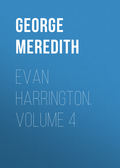
George Meredith
The Tragic Comedians: A Study in a Well-known Story. Complete
CHAPTER XVIII
In the house of the Rudigers there was commotion. Clotilde sat apart from it, locked in her chamber. She had performed her crowning act of obedience to her father by declining the interview with Alvan, and as a consequence she was full of grovelling revolt.
Two things had helped her to carry out her engagement to submit in this final instance of dutifulness—one was the sight of that hateful rigid face and glacier eye of Tresten; the other was the loophole she left for subsequent insurgency by engaging to write to Count Hollinger’s envoy, Dr. Storchel. She had gazed most earnestly at him, that he might not mistake her meaning, and the little man’s pair of spectacles had, she fancied, been dim. He was touched. Here was a friend! Here was the friend she required, the external aid, the fresh evasion, the link with Alvan! Now to write to him to bind him to his beautiful human emotion. By contrast with the treacherous Tresten, whose iciness roused her to defiance, the nervous little advocate seemed an emissary of the skies, and she invoked her treasure-stores of the craven’s craftiness in revolt to compose a letter that should move him, melt the good angel to espouse her cause. He was to be taught to understand—nay, angelically he would understand at once—why she had behaved apparently so contradictorily. Fettered, cruelly constrained by threats and wily sermons upon her duty to her family, terrorized, a prisoner ‘beside this blue lake, in sight of the sublimest scenery of earth,’ and hating his associate—hating him, she repeated and underscored—she had belied herself; she was willing to meet Alvan, she wished to meet him. She could open her heart to Alvan’s true friend—his only true friend. He would instantly discern her unhappy plight. In the presence of his associate she could explain nothing, do nothing but what she had done. He had frozen her. She had good reason to know that man for her enemy. She could prove him a traitor to Alvan. Certain though she was from the first moment of Dr. Storchel’s integrity and kindness of heart, she had stood petrified before him, as if affected by some wicked spell. She owned she had utterly belied herself; she protested she had been no free agent.
The future labours in her cause were thrown upon Dr. Storchel’s shoulders, but with such compliments to him on his mission from above as emissary angels are presumed to be sensibly affected by.
The letter was long, involved, rather eloquent when she forgot herself and wrote herself, and intentionally very feminine, after the manner of supplicatory ladies appealing to lawyers, whom they would sway by the feeble artlessness of a sex that must confide in their possession of a heart, their heads being too awful.
She was directing the letter when Marko Romaris gave his name outside her door. He was her intimate, her trustiest ally; he was aware of her design to communicate with Dr. Storchel, and came to tell her it would be a waste of labour. He stood there singularly pale and grave, unlike the sprightly slave she petted on her search for a tyrant. ‘Too late,’ he said, pointing to the letter she held. ‘Dr. Storchel has gone.’
She could not believe it, for Storchel had informed her that he would remain three days. Her powers of belief were more heavily taxed when Marko said: ‘Alvan has challenged your father to fight him.’ With that he turned on his heel; he had to assist in the deliberations of the family.
She clasped her temples. The collision of ideas driven together by Alvan and a duel—Alvan challengeing her father—Alvan, the contemner of the senseless appeal to arms for the settlement ‘of personal disputes!—darkened her mind. She ran about the house plying all whom she met for news and explanations; but her young brother was absent, her sisters were ignorant, and her parents were closeted in consultation with the gentleman. At night Marko sent her word that she might sleep in peace, for things would soon be arranged and her father had left the city.
She went to her solitude to study the hard riddle of her shattered imagination of Alvan. The fragments would not suffer joining, they assailed her in huge heaps; and she did not ask herself whether she had ever known him, but what disruption it was that had unsettled the reason of the strongest man alive. At times he came flashing through the scud of her thoughts magnificently in person, and how to stamp that splendid figure of manhood on a madman’s conduct was the task she supposed herself to be attempting while she shrank from it, and worshipped the figure, abhorred the deed. She could not unite them. He was like some great cathedral organ foully handled in the night by demons. He, whose lucent reason was an unclouded sky over every complexity of our sphere, he to crave to fight! to seek the life-blood of the father of his beloved! More unintelligible than this was it to reflect that he must know the challenge to be of itself a bar to his meeting his Clotilde ever again. She led her senses round to weep, and produced a state of mental drowning for a truce to the bitter riddle.
Quiet reigned in the household next day, and for the length of the day. Her father had departed, her mother treated her vixenishly, snubbing her for a word, but the ugly business of yesterday seemed a matter settled and dismissed. Alvan, then, had been appeased. He was not a man of blood: he was the humanest of men. She was able to reconstruct him under the beams of his handsome features and his kingly smile. She could occasionally conjure them up in their vividness; but had she not in truth been silly to yield to spite and send him back the photographs of him with his presents, so that he should have the uttermost remnant of the gifts he asked for? Had he really asked to have anything back? She inclined to doubt all that had been done and said since their separation—if only it were granted her to look on a photograph showing him as he was actually before their misunderstanding! The sun-tracing would not deceive, as her own tricks of imageing might do: seeing him as he was then, the hour would be revived,—she would certainly feel him as he lived and breathed now. Thus she fancied, on the effort to get him to her heart after the shock he had dealt it, for he had become almost a stranger, as a god that has taken human shape and character.
Next to the sight of Alvan her friend Marko was welcome. The youth visited her in the evening, and with the glitter of his large black eyes bent to her, and began talking incomprehensibly of leave-taking and farewell, until she cried aloud that she had riddles enough: one was too much. What had he to say? She gave him her hand to encourage him. She listened, and soon it was her hand that mastered his in the grasp, though she was putting questions incredulously, with an understanding duller than her instinct. Or how if the frightful instinct while she listened shot lightnings in her head, whose revelations were too intelligible to be looked at? We think it devilish when our old nature is incandescent to talk to us in this way, kindled by its vilest in hoping, hungering, and fearing; and we call on the civilized mind to disown it. The tightened grasp of her hand confessed her understanding of the thing she pressed to hear repeated, for the sake of seeming to herself to repudiate it under an accumulating horror, at the same time that the repetition doubly and trebly confirmed it, so as to exonerate her criminal sensations by casting the whole burden on the material fact.
Marko, with her father’s consent and the approval of the friends of the family, had taken up Alvan’s challenge! That was the tale. She saw him dead in the act of telling it.
‘What?’ she cried: ‘what?’ and then: ‘You?’ and her fingers were bonier in their clutch: ‘Let me hear. It can’t be!’ She snapped at herself for not pitying him more but a sword had flashed to cut her gordian knot: she her saw him dead, the obstacle removed, the man whom her parents opposed to Alvan swept away: she saw him as a black gate breaking to a flood of light. She had never invoked it, never wished, never dreamed it, but if it was to be?… ‘Oh! impossible. One of us is crazy. You to fight? … they put it upon you? You fight him? But it is cruel, it is abominable. Incredible! You have accepted the challenge, you say?’
He answered that he had, and gazed into her eyes for love.
She blinked over them, crying out against parents and friends for their heartlessness in permitting him to fight.
‘This is positive? This is really true?’ she said, burning and dreading to realize the magical change it pointed on, and touching him with her other hand, loathing herself, loathing parents and friends who had brought her to the plight of desiring some terrible event in sheer necessity. Not she, it was the situation they had created which was guilty! By dint of calling out on their heartlessness, and a spur of conscience, she roused the feeling of compassion:
‘But, Marko! Marko! poor child! you cannot fight; you have never fired a pistol or a gun in your life. Your health was always too delicate for these habits of men; and you could not pull a trigger taking aim, do you not know?’
‘I have been practising for a couple of hours to-day,’ he said.
Compassion thrilled her. ‘A couple of hours! Unhappy boy! But do you not know that he is a dead shot? He is famous for his aim. He never misses. He can do all the duellist’s wonders both with sword and pistol, and that is why he was respected when he refused the duel because he—before these parents of mine drove him… and me! I think we are both mad—he despised duelling. He! He! Alvan! who has challenged my father! I have heard him speak of duelling as cowardly. But what is he? what has he changed to? And it would be cowardly to kill you, Marko.’
‘I take my chance,’ Marko said.
‘You have no chance. His aim is unerring.’ She insisted on the deadliness of his aim, and dwelt on it with a gloating delight that her conscience approved, for she was persuading the youth to shun his fatal aim.
If you stood against him he would not spare you—perhaps not; I fear he would not, as far as I know him now. He can be terrible in wrath. I think he would warn you; but two men face to face! and he suspecting that you cross his path! Find some way of avoiding him. Do, I entreat you. By your love of me! Oh! no blood. I do not want to lose you. I could not bear it.’
‘Would you regret me?’ said he.
Her eyes fell on his, and the beauty of those great dark eyes made her fondness for him legible. He caused her a spasm of anguish, foreknowing him doomed. She thought that haply this devoted heart was predestined to be the sacrifice which should bring her round to Alvan. She murmured phrases of dissuasion until her hollow voice broke; she wept for being speechless, and turned upon Providence and her parents, in railing at whom a voice of no ominous empty sound was given her; and still she felt more warmly than railing expressed, only her voice shrank back from a tone of feeling. She consoled herself with the reflection that utterance was inadequate. Besides, her active good sense echoed Marko ringingly when he cited the usages of their world and the impossibility of his withdrawing or wishing to withdraw from the line of a challenge accepted. It was destiny. She bowed her head lower and lower, oppressed without and within, unwilling to look at him. She did not look when he left her.
The silence of him encouraged her head to rise. She stared about: his phantom seemed present, and for a time she beheld him both upright in life and stretched in death. It could not be her fault that he should die! it was the fatality. How strange it was! Providence, after bitterly misusing her, offered this reparation through the death of Marko.
Possibly she ought to run out and beseech Alvan to spare the innocent youth. She stood up trembling on her legs. She called to Alvan. ‘Do not put blood between us. Oh! I love you more than ever. Why did you let that horrible man you take for a friend come here? I hate him, and cannot feel my love of you when I see him. He chills me to the bone. He made me say the reverse of what was in my heart. But spare poor Marko! You have no cause for jealousy. You would be above it, if you had. Do not aim; fire in the air. Do not let me kiss that hand and think…’
She sank to her chair, exclaiming: ‘I am a prisoner!’ She could not walk two steps; she was imprisoned by the interdict of the house and the paralysis of her limbs. Providence decreed that she must abide the result. Dread Power! To be dragged to her happiness through a river of blood was indeed dreadful, but the devotional sense of reliance upon hidden wisdom in the direction of human affairs when it appears considerate of our wishes, inspirited her to be ready for what Providence was about to do, mysterious in its beneficence that it was! It is the dark goddess Fortune to the craven. The craven with desires will offer up bloody sacrifices to it submissively. The craven, with desires expecting to be blest, is a zealot of the faith which ascribes the direction of events to the outer world. Her soul was in full song to that contriving agency, and she with the paralyzed limbs became practically active, darting here and there over the room, burning letters, packing a portable bundle of clothes, in preparation for the domestic confusion of the morrow when the body of Marko would be driven to their door, and amid the wailing and the hubbub she would escape unnoticed to Alvan, Providence-guided! Out of the house would then signify assuredly to Alvan’s arms.
The prospect might have seemed too heavenly to be realizable had she not been sensible of paying heavily for it; and thus, as he would wish to be, was Marko of double service to her; for she was truly fond of the beautiful and chivalrous youth, and far from wishing to lose him. His blood was on the heads of those who permitted him to face the danger! She would have felt for him still more tenderly if it were permitted to a woman’s heart to enfold two men at a time. This, it would seem, she cannot do: she is compelled by the painful restriction sadly to consent that one of them should be swept away.
Night passed dragging and galloping. In the very early light she thought of adding some ornaments to her bundle of necessaries. She learnt of the object of her present faith to be provident on her own behalf, and dressed in two of certain garments which would have swollen her bundle too much.
This was the day of Providence: she had strung herself to do her part in it and gone through the pathos of her fatalism above stairs in her bedroom before Marko took his final farewell of her, so she could speak her ‘Heaven be with you!’ unshaken, though sadly. Her father had returned. To be away from him, and close to her bundle, she hurried to her chamber and awaited the catastrophe, like one expecting to be raised from the vaults. Carriage, wheels would give her the first intimation of it. Slow, very slow, would imply badly wounded, she thought: dead, if the carriage stopped some steps from the house and one of the seconds of the poor boy descended to make the melancholy announcement. She could not but apprehend the remorselessness of the decree. Death, it would probably be! Alvan had resolved to sweep him off the earth. She could not blame Alvan for his desperate passion, though pitying the victim of it. In any case the instant of the arrival of the carriage was her opportunity marked by the finger of Providence rendered visible, and she sat rocking her parcel on her lap. Her love of Alvan now was mixed with an alluring terror of him as an immediate death-dealer who stood against red-streaked heavens, more grandly satanic in his angry mightiness than she had ever realized that figure, and she, trembled and shuddered, fearing to meet him, yearning to be taken to him, to close her eyes on his breast in blindest happiness. She gave the very sob for the occasion.
A carriage drove at full speed to the door. Full speed could not be the pace for a funeral load. That was a visitor to her father on business. She waited for fresh wheels, telling herself she would be patient and must be ready.
Her pathos ways ready and scarcely controllable. The tear thickened on her eyelid as she projected her mind on the grief she would soon be undergoing for Marko: or at least she would undergo it subsequently; she would certainly mourn for him. She dared not proceed to an accumulated enumeration of his merits, as her knowledge of the secret of pathos knew to be most moving, in an extreme fear that she might weaken her required energies for action at the approaching signal.
Feet came rushing up the stairs: her door was thrown open, and the living Marko, stranger than a dead, stood present. He had in his look an expectation that she would be glad to behold him, and he asked her, and she said: ‘Oh, yes, she was glad, of course.’ She was glad that Alvan had pardoned him for his rashness; she was vexed that her projected confusion of the household had been thwarted: vexed, petrified with astonishment.
‘But how if I tell you that Alvan is wounded?’ he almost wept to say.
Clotilde informs the world that she laughed on hearing this. She was unaware of her ground for laughing: It was the laugh of the tragic comedian.
Could one believe in a Providence capable of letting such a sapling and weakling strike down the most magnificent stature upon earth?
‘You—him!’ she said, in the tremendous compression of her contempt.
She laughed. The world is upside down—a world without light, or pointing finger, or affection for special favourites, and therefore bereft of all mysterious and attractive wisdom, a crazy world, a corpse of a world—if this be true!
But it can still be disbelieved.
He stood by her dejectedly, and she sent him flying with a repulsive, ‘Leave me!’ The youth had too much on his conscience to let him linger. His manner of going smote her brain.
Was it credible? Was it possible to think of Alvan wounded?—the giant laid on his back and in the hands of the leech? Assuredly it was a mockery of all calculations. She could not conjure up the picture of him, and her emotions were merely struck and stunned. If this be true!
But it can be resolutely disbelieved.
We can put it before Providence to cleanse itself of this thing, or suffer the consequence that we now and for ever quit our worship, lose our faith in it and our secret respect. She heard Marko’s tale confirmed, whispers of leaden import, physicians’ rumours, and she doubted. She clung insanely to her incredulity. Laughter had been slain, but not her belief in the invincibility of Alvan; she could not imagine him overthrown in a conflict—and by a hand that she had taken and twisted in her woman’s hand subduingly! He, the unerring shot, laid low by one who had never burnt powder till the day before the duel! It was easier to remain incredulous notwithstanding the gradational distinctness of the whispers. She dashed her ‘Impossible!’ at Providence, conceived the tale in wilful and almost buoyant self-deception to be a conspiracy in the family to hide from her Alvan’s magnanimous dismissal of poor Marko from the field of strife. That was the most evident fact. She ran through delusion and delusion, exhausting each and hugging it after the false life was out.
So violent was the opposition to reason in the idea of Alvans descending to the duel and falling by the hand of Marko, that it cried to be rebutted by laughter: and she could not, she could laugh no more, nor imagine laughing, though she could say of the people of the house, ‘They act it well!’ and hate them for the serious whispering air, and the dropping of medical terms and weights of drugs, which robbed her of what her instinct told her was the surest weapon for combating deception. Them, however, and their acting she could have with stood enough to silently discredit them through sheer virulence of a hatred that proved them to be duly credited. But her savage wilfulness could not resist the look of Marko. She had to yield up her breast to the truth, and stimulate further unbelief lest her loaded heart should force her to run to the wounded lion’s bedside, and hear his reproaches. She had to cheat her heart, and the weak thing consented to it, loathing her for the imposture. Seeing Marko too, assured of it by his broken look, the terrible mournfulness less than the horrible irony of the truth gnawed within her. It spoke to her in metal, not in flesh. It haunted her feelings and her faint imaginations alienly. It discoloured, it scorned the earth, and earth’s teachings, and the understanding of life. Rational clearness at all avenues was blurred by it. The thought that Alvan lay wounded and in danger, was one thought: that Marko had stretched him there, was quite another, and was a livid eclipsing thought through which her grief had to work its way to get to heat and a state of burning. She knew not in truth what to feel: the craven’s dilemma when yet feeling much. Anger at Providence—rose uppermost. She had so shifted and wound about, and so pulled her heart to pieces, that she could no longer sanely and with wholeness encounter a shock: she had no sensation firm enough to be stamped by a signet.
Even on the fatal third day, when Marko, white as his shrouded antagonist, led her to the garden of the house, and there said the word of death, an execrating amazement, framing the thought ‘Why is it not Alvan who speaks?’ rose beside her gaping conception of her loss. She framed it as an earnest interrogation for the half minute before misery had possession of her, coming down like a cloud. Providence then was too shadowy a thing to upbraid. She could not blame herself, for the intensity of her suffering testified to the bitter realness of her love of the dead man. Her craven’s instinct to make a sacrifice of others flew with claws of hatred at her parents. These she offered up, and the spirit presiding in her appears to have accepted them as proper substitutes for her conscience.






